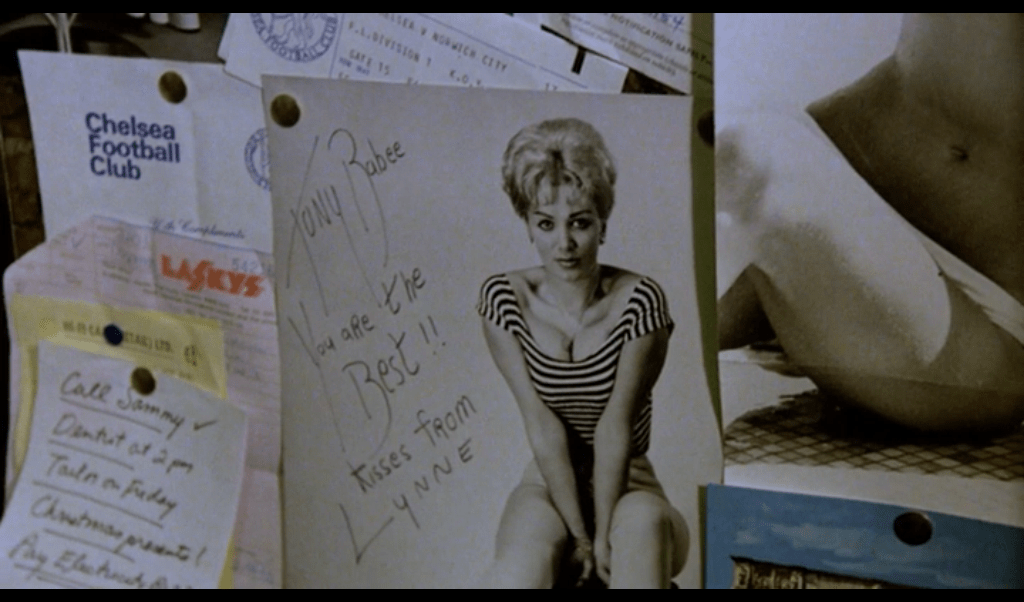
“Darling he’s my masterpiece. I own him. I have turned a common waiter into one of the most fancied men in London.”
This chintzy disco-infused adaptation of Jackie Collins 1969 novel is generally regarded as a joke, but there’s two reasons I feel The Stud is so much better than its reputation suggests. Firstly Joan Collins is essentially auditioning for her role as Alexis in Dynasty, and secondly it’s got a better handle on the British class system than you expect from a film that’s usually categorised alongside 1970s’ sex-comedies or outright sexploitation films. The titular stud however remains every bit as hapless as Robin Askwith’s bed-hopping protagonist in the Confessions of movies. Tony Blake (Oliver Tobias) makes all the wrong moves in a world where he can only ever be an amusement to the rich people he serves in the nightclub or between the sheets, or a problem to be removed from their sight. Oddly it reminded me of Peter Greenaway’s The Draughtsman’s Contract (1982) which feels like a more esoteric version of the same theme.
The film opens by panning across a notice board covered with photos and fond messages from women he’s been with. One of them is from Jackie Collins herself, which is very meta inserting herself into the movie and implying she slept with her own creation. Collins followed her big sister Joan into acting but her heart wasn’t in it. She had a few small roles in films and guested on shows like Danger Man and The Saint (pictured below) before turning to writing and publishing her first novel The World is Full of Married Men (1968).

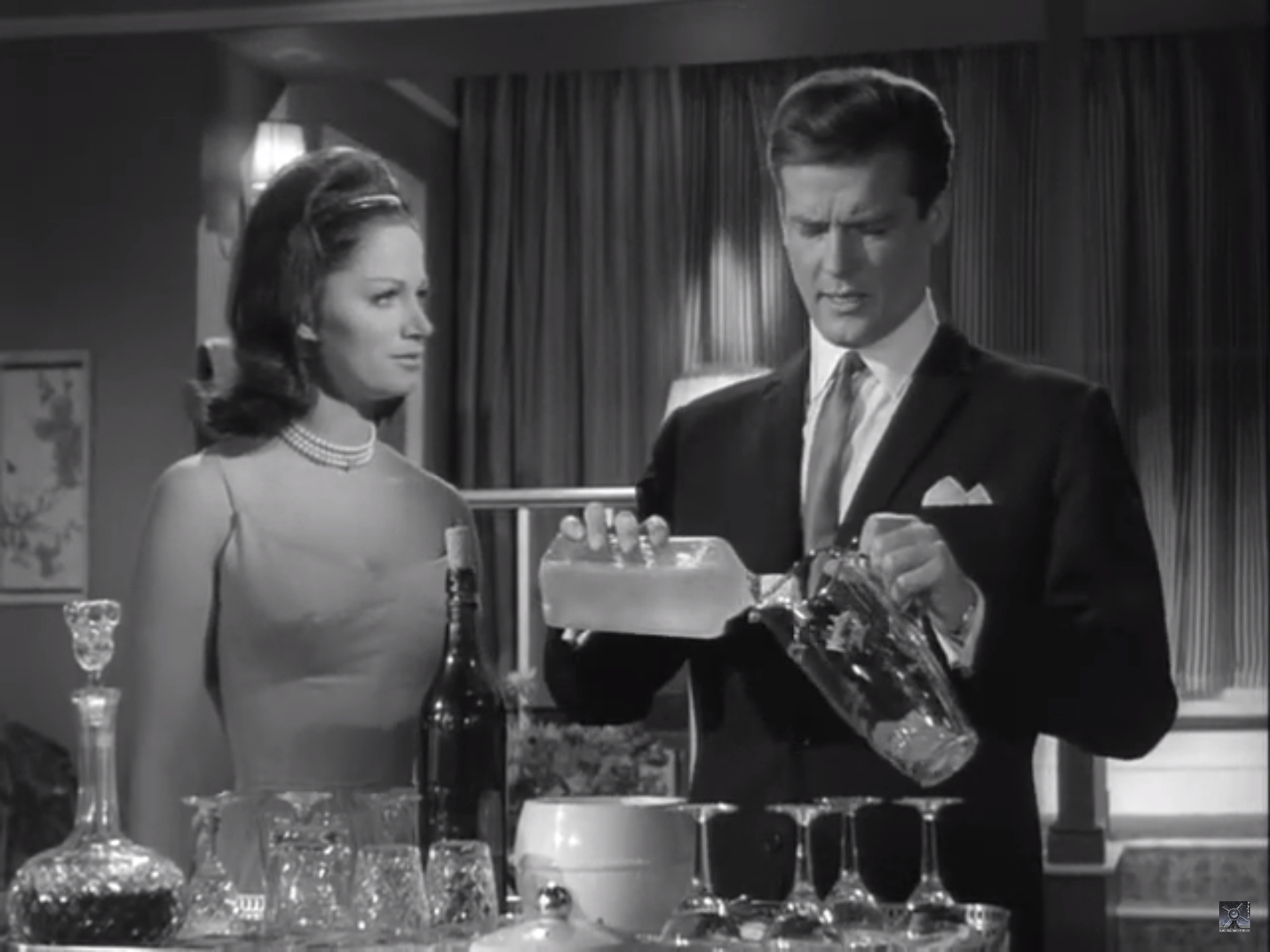
The Stud was published in 1969, right at the end of a decade when popular culture and sports gave talented young working-class people the chance to move up in the world. Collins must have seen a few of these burn out. I’d imagine one of those was George Best judging by her screenplay for Yesterday’s Hero (1979), which follows a washed up striker (Ian McShane) plying his trade in the old 3rd division while drinking himself into oblivion. Tony Blake doesn’t know that’s where he’s headed. He thinks he’s got it made.

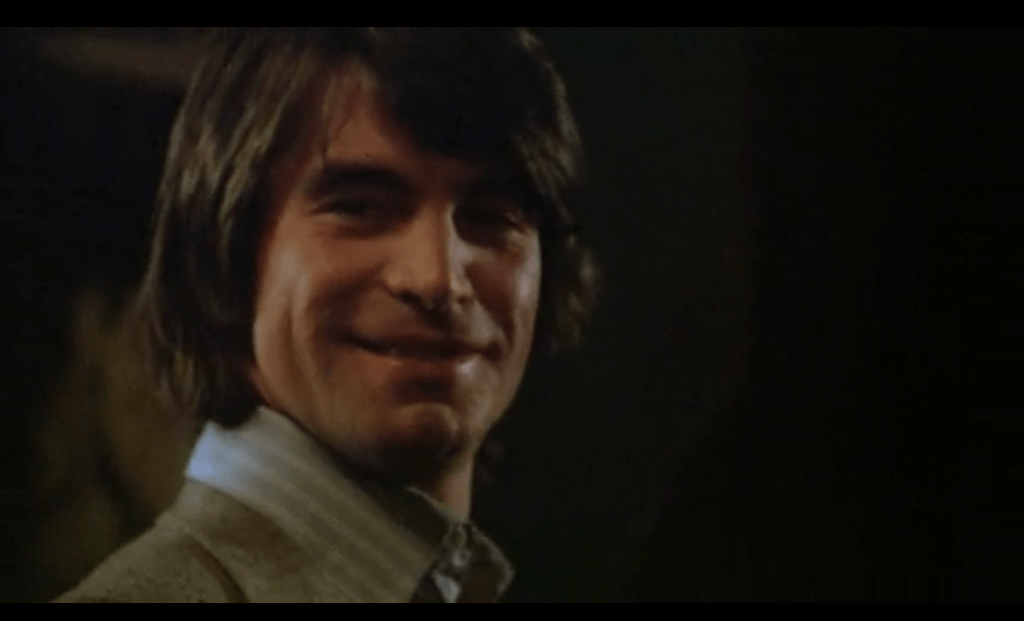
The quietly intense Tobias was best known at this point as the lead in Arthur of the Britons (1972), a gritty attempt at telling the story of the historical King Arthur made by HTV which ran for two seasons. He’d also worked in Australia on Luke’s Kingdom, which was partly directed by Peter Weir shortly after his success with The Cars That Ate Paris (1974) and Picnic At Hanging Rock (1975).
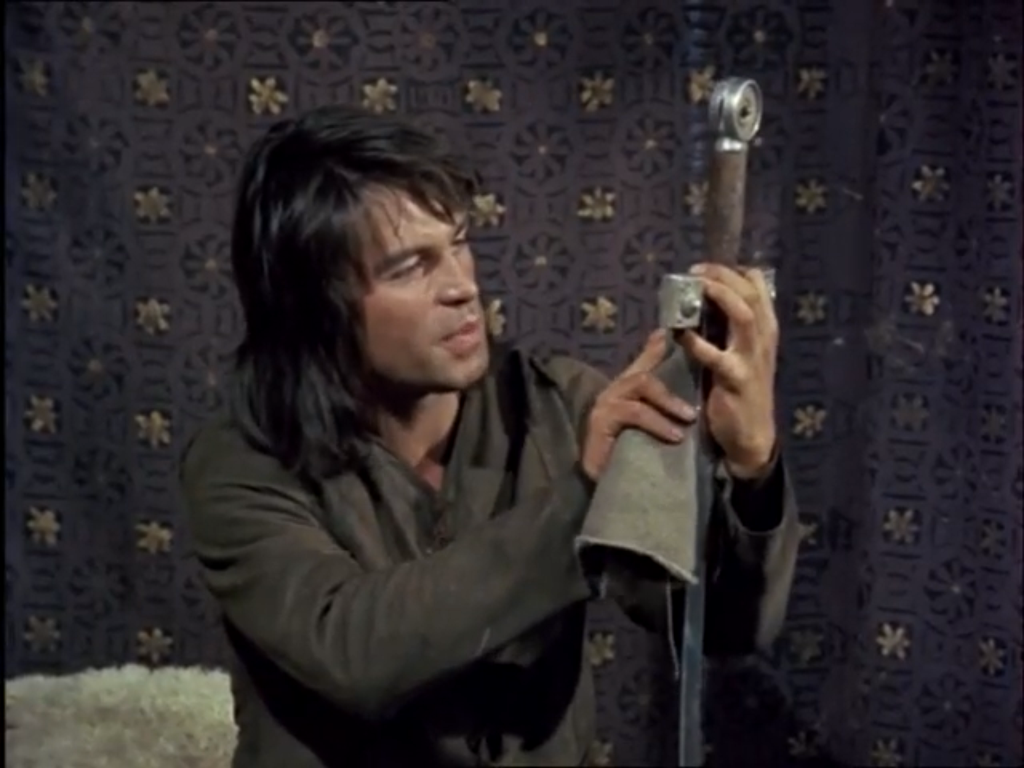
The Stud opens with a reversal of a trope common in 70s British cinema. Somebody trying to sneak away from a one-night-stand without waking them, only this time it’s a woman doing the tip-toeing towards the door with her shoes in her hands. The phone rings and spoils her getaway. . He wakes up. “No bye-byes?” Tony’s patter’s pish by the way, one eye-roller after another, but he looks like Oliver Tobias so he everybody cuts him slack. She makes her excuses and tells him she’ll call. He’s happy enough to be used, he’s using them too.
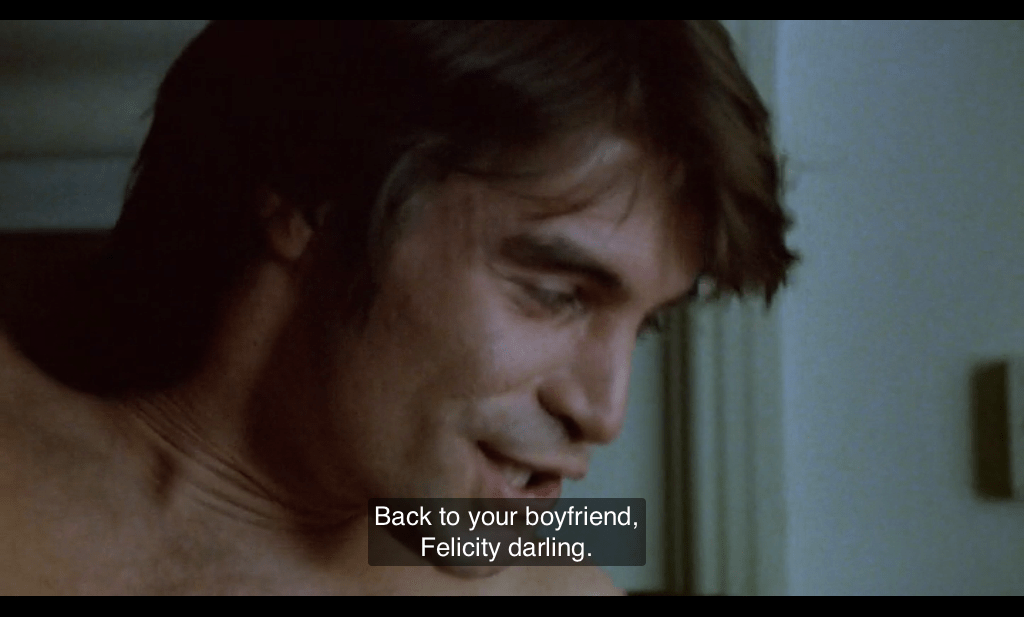
Time has moved on since the novel and the disco generation has arrived. Biddu Orchestra provide the opening track which plays over a montage of Tobias getting ready for work. “Whats his name? what’s his name..Stuuddd..” He picks out a suit from a walk-in wardrobe, divides his mail into two piles then half-volleys the bills out of the door, downs a mouthful of vitamins, chooses a pair of Italian loafers, puts on a fancy watch, picks up his money-clip, grabs a tie, then he’s out the door and into his wee red sports convertible. Finally he uses the privilege afforded to him by being a handsome bastard to dodge a parking ticket.
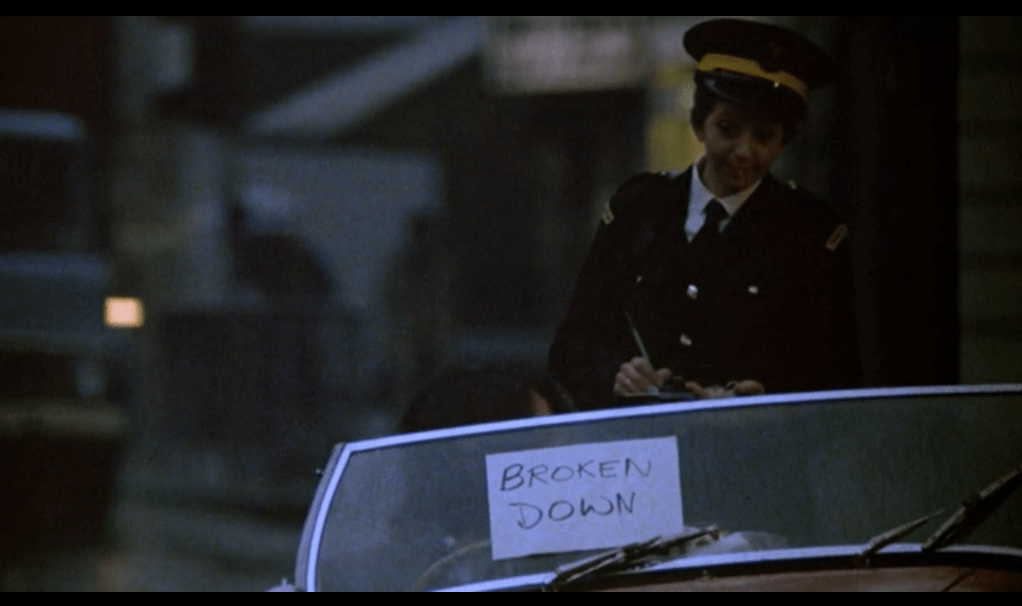
We’ve seen Tony Blake at play. Now we see him at work albeit briefly, reworking the maitre d’s table-plan for the evening so the right people are on the right table, “Put them back in oblivion where they belong.” Then he’s out the door again when the phone rings, and the staff are all sniggering behind his back because they know the owner Fontaine (Joan Collins) has summoned him for a booty call. When he arrives she’s waiting on the balcony. She is literally placed above him in the frame and by entering this building he is being allowed to ascend to her level.

Fontaine is married to a rich businessman called Benjamin Khaled (Walter Gotell) and The Hobo nightclub and by extension Tony are her playthings. However Khaled doesn’t know Tony is anything but the bright young thing who rose through the ranks from waiting tables to managing the place. So it’s not wise of Tony to have sex with Fontaine in a lift with a CCTV security camera system which is hooked up to Khaled’s apartment.
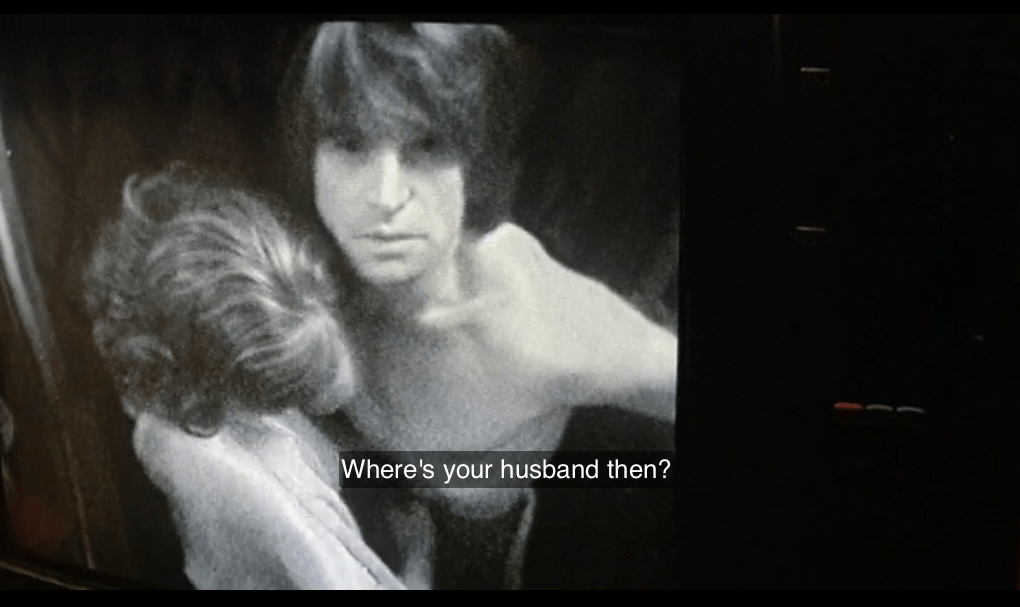
I’m not even sure they reached the apartment. Tony’s back at the club in no time running the floor, mingling with guests and making sure everybody’s happy. Felicity is there with her boyfriend which is awkward. Disco band The Real Thing are performing onstage and the dance-floor is packed with 20-something’s having a great time. In fact I’m pretty sure that 70s’ dance troupe Legs & Co, a popular staple of late 70s’ and 80s’ light entertainment TV shows, are in there as well.

Then a problem appears in the form of potato-faced Lord Newton (Constantine Gregory) who’s turned up with two of his mates expecting a table despite having no reservation. Tony invokes a rule that single gentlemen cannot enter because it makes couples uncomfortable, a rule that seems pretty flexible because he lets two single gentlemen in while he’s talking to Newton. Something that does not go unnoticed. Lord Newton threatens to cancel his membership but walks it back as a joke when Tony accepts his resignation. Newton has apparently a history with Tony who waited on him when he was younger for little reward. “A waiter never forgets eh?” says his friend as the Lord leaves.

Neither do rich people though and every interaction Tony has in this movie comes back to haunt him. In the gents toilets he tries to convince Thane (Peter Lukas) into providing capital for a new club. They’re interrupted by a Mick Jagger lookalike rock star (played by Mick’s younger brother Chris) snorting coke. When Tony reprimands him he retorts “who ever heard of a seventy-year old rock star?” Which is funny some 41 years later because well, now there’s Mick Jagger. But faux-Mick Jagger hits him with a verbal low blow. “Seventy-year old greeters aren’t much in demand either.” Deep down Tony knows he’s right but his clumsy attempts to machinate a successful exit prove to be destructive.

The music Biddu chooses for each scene complements the film. Some of lyrics feel a little on the nose. When Tony leaves the gents after trying to engineer the deal to leave The Hobo the house band is covering Leo Sayer. “Moonlighting/They’re leaving everything/Moonlighting/They’re losing all their friends.” Then at the end of the night when only the stragglers are left and the disco kids are gone it’s slow dancing to 10cc’s I’m Not in Love. “Just because/ I call you up/don’t think you got it made.” Tony goes home with a playboy centrefold Molly (Minah Bird) but his time with her is ended by a call from Fontaine telling hims she’s coming over. A call she makes to prove to her friend Vanessa (Sue Lloyd) she can have him any time she likes. Molly’s assumes he’s a gigolo. “Hey you do this for a living huh?” Vanessa also has eyes on Tony and asks for Fontaine to bring him to one of their parties in Paris while they’re watching the security camera footage of them together in the lift. Unfortunately for Tony they notice him checking the time mid-tryst and by Collins expression we know he’s done for.
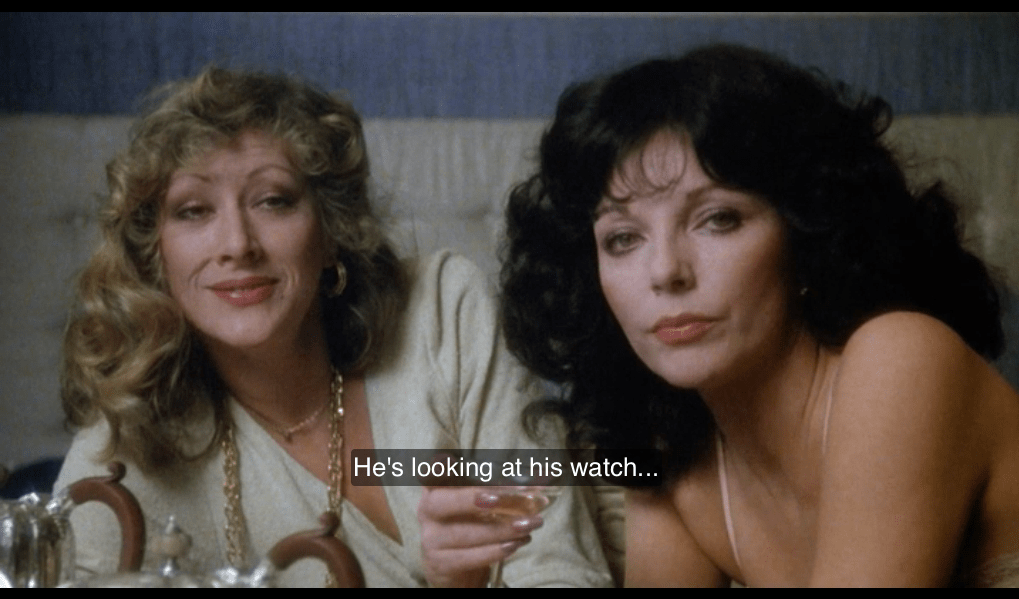
His old mates at an East End snooker club tell him as much. “You’re playing a mugs game Tony.” This from a chancer who makes a living sponging sponging off older women but he’s right. Tony doesn’t own the club, is treated as property by the actual owner, and her husband will find out sooner or later. Especially if he checks the video recorder in his apartment.

Khaled and Fontaine turn up at The Hobo just as Tony has to remove a drunken Lord Newton who had decided to treat the other patrons to a boozy rendition of the St Crispin’s Day speech from Henry V with a pair of underpants on his head before throwing a haymaker at Tony. “You’re nothing but a working-class bum in Gucci shoes.” Afterwards he sits down with Khaled and his family and meets the person who will be the architect of his destruction. It’s not Khaled, or Fontaine, but a far more cunning adversary. Khaled’s teenage daughter Alexandra (Emma Jacobs).

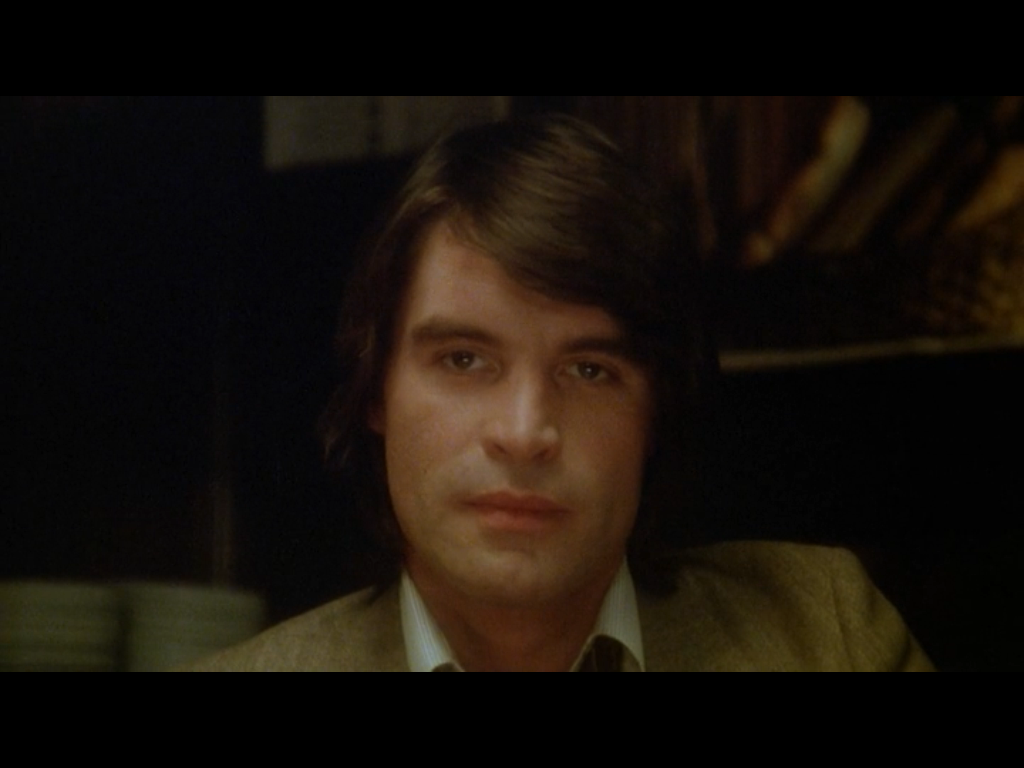
“Funny place wasn’t it?” Says Peter her chinless boyfriend in the car later. Although they were the ones who looked out of place, turning up at a disco club dressed like the ghosts of Victorian children who died of consumption and now haunt a large house in the country. Alexandra’s best pal Maddie (Natalia Ogle) overheard a conversation between Fontaine and Vanessa in the toilets about their plans to Shanghai Tony in Paris. She’s now watching the videotape of the two of them in the lift which Fontaine has inexplicably left in the machine. Alexandra swears revenge on Tony and her stepmother, changes out of her Victorian frock garment, and heads back to the club in more disco friendly garb to seduce Tony who falls for her hard.

In Paris Tony sits down for what he assumes will be a nice civilised meal next to the cream of French society and that he’s finally moving up in the world. Instead he finds out he’s dessert during an absurd swimming pool orgy sequence involving a trapeze (which quite frankly looks rather dangerous). Then when Leonard (Mark Burns) makes a grab for him in the pool Tony ends up fleeing from the building in a gay panic. “I thought I’d trained all that working-class taboo out of you” says Fontaine who like Victor Frankenstein is about to abandon her creation. How will I get home he wonders and Collins says goodbye with “Why don’t you fuck yourself there darling?”
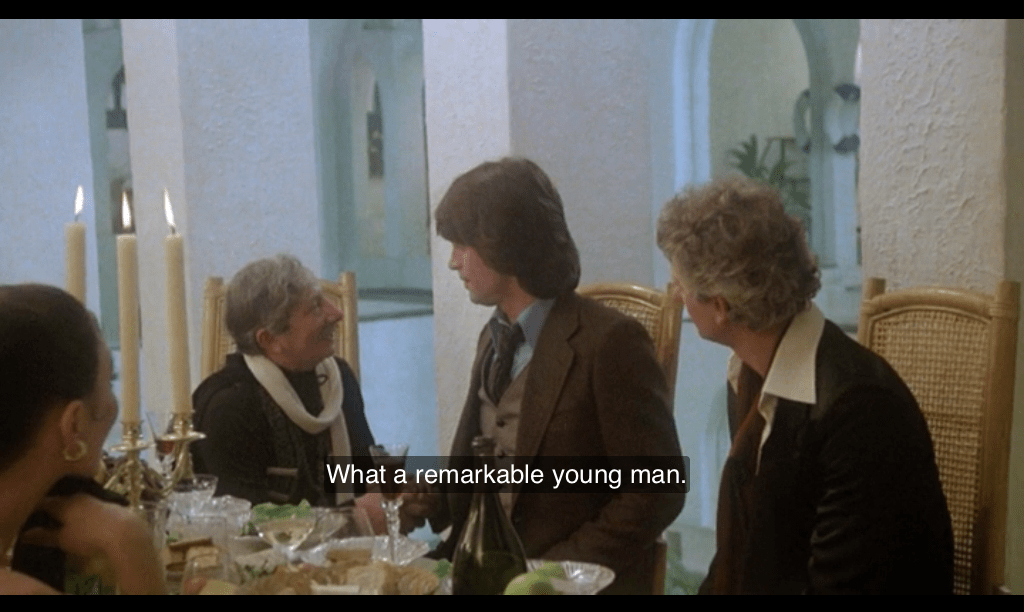

By now we know Alexandra has shopped Tony and Fontaine to her father and Khaled has watched the videotape and called a divorce lawyer. So it’s even more excruciating than the scenes in Paris when he gatecrashes a Christmas party at Alexandra’s mother’s home in the country. A get together attended by a vicar, and old colonel types who react with astonishment when offered a drink he asks for a whisky and coke. “Comme en cheval” says Alexandra to Maddie which translates as “like a horse” but he’s not here to be taken advantage of. This time he’s here to be humiliated and shown his place.

So the golden boy of the clubbing scene finds himself back at home for Christmas sitting in front of the television with his elderly parents. Nobody’s taking his calls and he finds himself down by the docklands with his old snooker buddy who tells him the patrons at The Hobo have heard various rumours about him. That he’s doing the club scene up North, or he’s fled to South America. Meanwhile he still thinks he can get Thane to follow through on his agreement to help him open his own club.
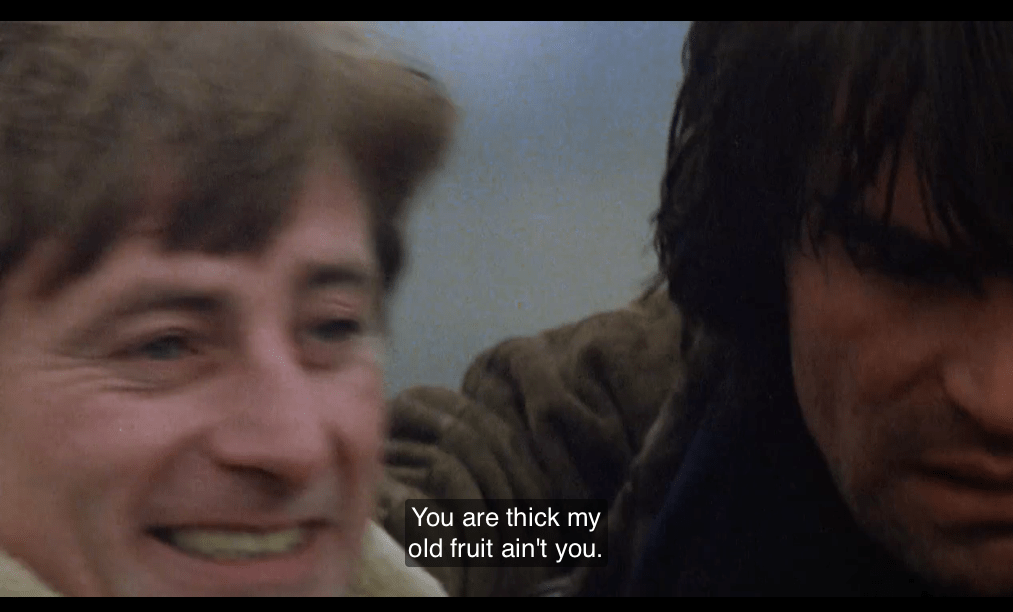
The last scene is like a nightmare. Tony returns to the club for Hogmanay, but this time when he’s surrounded and pawed on the dance floor by the guests it’s framed like a horror film, as if he’s being overwhelmed by zombies. Everybody’s here, his Ghosts of Christmas past. Peter announces his marriage to Alexandra and tells Tony they’ll be holding it here. Felicity grabs him, then Molly, then Vanessa, then Leonard, spinning him round the dance floor until he’s face to face for one final kiss-off from Fontaine. Khaled has sold his share to Thane and he’s now co-owner of The Hobo. Marco has been promoted to manager. “Don’t be here tomorrow will you Tony” she says, Lord Newton dancing like a muppet in the background. Then one final misstep. Trying to attack Thane in the gents and getting a shoeing from security. It’s like a fever dream now. The countdown for the bells begins. 10, 9, 8… and Tony’s running for the exit. 7,6,5, 4, like Orpheus leaving the Underworld but there’s no reason to look back. 3,2,1 and he’s out and breathing in the London air. The doors closing behind him.
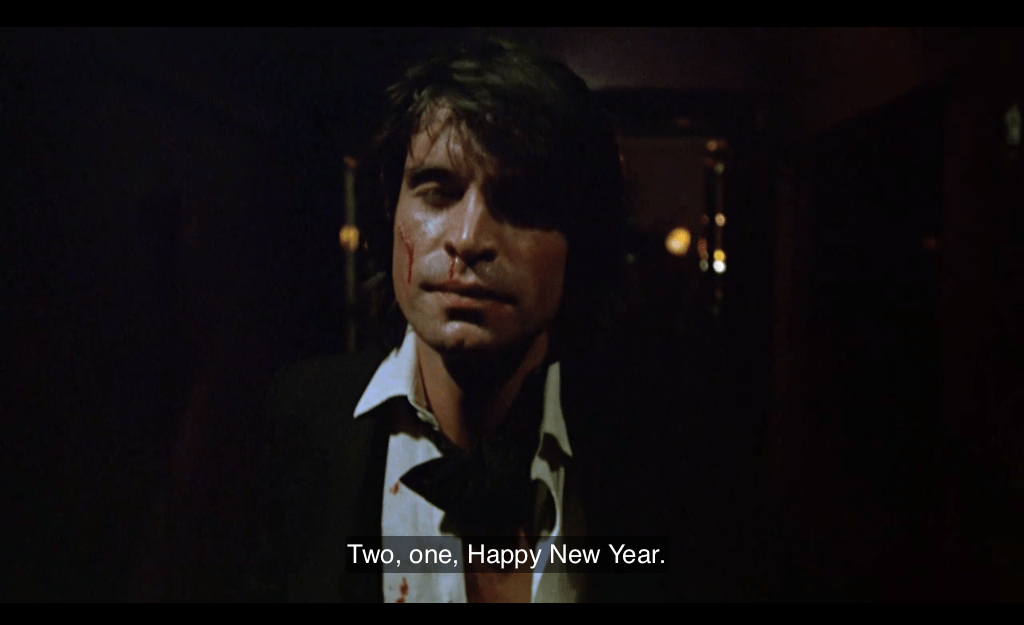
In the sequel The Bitch (1979, Gerry O’Hara) Fontaine is now divorced and returns from New York to find Marco has run The Hobo into the ground. Disco has peaked and the dance-floor is empty. Tony is nowhere to be seen but he does get a mention. If I remember correctly somebody says he’s in Huddersfield running a club but that might just be a story the few remaining punters tell to each other. The Stud never quite escaped the British sexploitation tag, but it feels closer in spirit to the TV mini-series and glossy prime-time soap operas we’d get in the 80s’ when everybody was rich and a bastard. Joan Collins would go on to star in arguably the greatest of these, Dynasty. Tobias would seem a perfect fit for shows like that as well but for one reason of not it never happened for him. Still he was very good in the Richard Carpenter scripted show Smuggler and a memorable villain in the same writer’s other hit Dick Turpin.

This post was part of the Rule Britannia Blogathon run by Terence Towles Canote over at Shroud of Thoughts.

